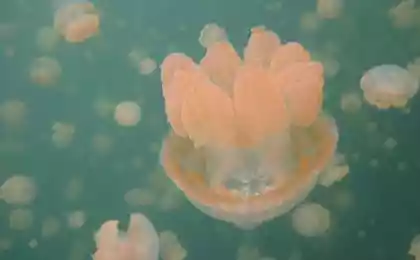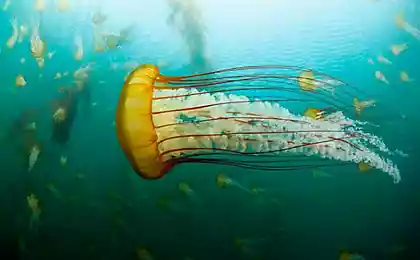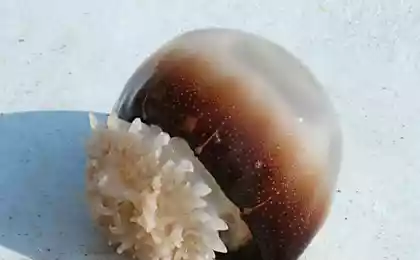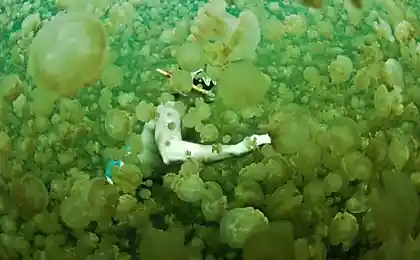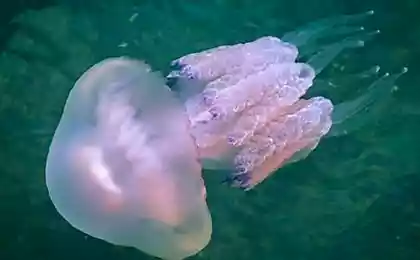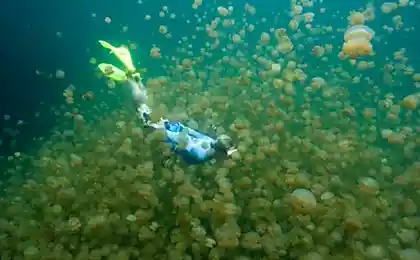495
Sunscreen will protect against jellyfish stings

Almost every swimming season around the world happen trouble associated with the invasion of jellyfish. Some tropical beaches are closed for swimming, and the risk to meet with a Medusa exists not only in salt but also in freshwater rivers and lakes — the reason for their resettlement in our latitudes, scientists believe global warming. The company "Lifesystems" decided to help the tourists and have developed a sun cream, simultaneously protects against jellyfish.
There are more than two hundred kinds of jellyfish. Many of them are relatively harmless – I mean, for the person meeting them is not fatal, but still unpleasant. Jellyfish have special stinging cells – is a very formidable weapon! When you touch of them are thrown out long stinging threads which cut into the victim's body and produce the poison. As a result, burns as from nettles, only much stronger.
However, there is among jellyfish and the real killers. The most dangerous inhabitants of the underwater depths is the Australian irukandji jellyfish is the size of a fingernail, but one dose of poison is enough to kill 60 people! Bite it is almost imperceptible, but about 20 minutes after the person develops a major heart attack, which often leads to death. Worst of all, jellyfish irukandji because of its modest size practically invisible in water and can easily penetrate through the protective network, designed for their larger relatives.
But today, thanks to the development of "Lifesystems", you can safely be in the water without getting stung. It is argued that in the new cream multiple components, "driving away" of jellyfish. In particular, useful novelty includes a mixture of protein and sugar, similar to what is in the body itself jellyfish. That is in contact with a man Medusa can take it for some part of their body, and therefore will not sting. In addition, the cream is very thick, so that the jellyfish is more difficult to directly touch human skin.

If someone is such a concept seems unreliable, then it is in vain. More recently, researchers from the Hebrew University in Jerusalem found that on the same principle are "working" tentacles of an octopus. It is known that their limbs are covered with hundreds of suction cups that cling to anything — with one important exception. These suckers do not grab the octopus! Otherwise, these flexible, quickly began to "bundle".
It looks especially strange when you consider that the brain of the octopus generally does not control his limbs: each tentacle has its own independent nervous system and operates independently from the "colleagues". However, in a recent issue of "Current Biology", scientists say that octopuses cope with this task due to the chemical substances that are produced by the octopus skin temporarily and give him suckers suck.
With regard to the development of the "Lifesystems", then sunscreen moisturizer has already undergone decades of clinical testing. Enriched with vitamin E, it applies easily and is quickly absorbed. At the moment the cream can be purchased in two versions: with protection factor 25 (SPF 25/200ml/£11.99) and 40 (SPF 40/100ml/£9.99).
The holiday season is coming, so the doctors again remind the tourists: in the periods of influx of jellyfish it is highly recommended not to go to sea and especially to swim, especially for young children. On the other hand, even when in coastal waters visually, everything is calm, to the shore can swim up a lonely individual. What to do if you are still getting stung by jellyfish?
First immediately rinse the burn with salt water and remove tentacles from the skin. In any case, it is not bland — it can enhance the rest of the skin stinging cells! To neutralize the jellyfish poison is best using natural lemon juice, solution of baking soda or 5% solution of vinegar: apply it on the burn, and then (if possible) apply a bag of ice, pre-wrapped it in a cotton cloth and be sure to consult your doctor.
Source: facepla.net
The children have different fathers— how to build relationships
A weather station for a country house
